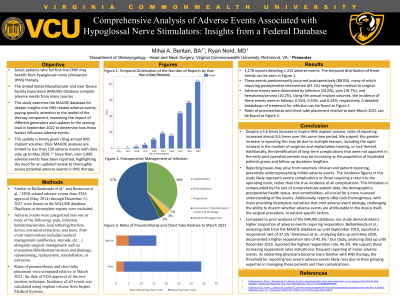Sleep Medicine
(1308) Comprehensive Analysis of Adverse Events Associated With Hypoglossal Nerve Stimulators: Insights From the MAUDE Database
Monday, September 30, 2024
12:00 PM - 1:00 PM EDT

Has Audio
Disclosure(s):
Mihai A. Bentan, B.S.: No relevant relationships to disclose.
Ryan Nord, MD: No relevant relationships to disclose.
Introduction: This study aims to examine the adverse events associated with hypoglossal nerve stimulator (HNS) implantation for treating obstructive sleep apnea (OSA), drawing data from the Manufacturer and User Facility Device Experience (MAUDE) database. We aim to provide a comprehensive and updated account of these adverse events.
Methods: A retrospective analysis was performed on the MAUDE database to collect all HNS-related reports from May 2014 to December 2023. Variables collected included date of event, event description, nature of event, iatrogenic injuries, required interventions, and, if available, root causes. Each event description was analyzed to classify the adverse event, the post-event intervention, and device model number.
Results: Out of 1,178 reports fulfilling the inclusion criteria, 1,310 adverse events were identified. Common adverse events included infection (24%), pain (19.2%), and hematoma/seroma (10.2%). Approximately 82.7% of these adverse events necessitated medical and/or surgical intervention. The most frequent procedures included explantation (29.5%) and device repositioning (15.4%). Pneumothorax was reported in 50 cases, with 45 (90%) requiring a chest tube to be inserted. Five adverse events described overstimulation in the setting of Magnetic Resonance Imaging (MRI) despite the implantation of MRI-compatible second-generation internal pulse generators.
Conclusions: While hypoglossal nerve stimulator implantation has been established as a reliable intervention for OSA in cases of CPAP failure or intolerance, the study highlights several perioperative and postoperative difficulties and complications. Understanding these challenges is essential for refining surgical practices and enhancing patient consent processes, ultimately aiming to improve therapeutic outcomes.
- MB
Mihai A. Bentan, BS
Medical Student
Virginia Commonwealth University
Aurora, Colorado, United States 
Ryan Nord, MD
Dr.
Virginia Commonwealth University
Richmond, Virginia, United States
